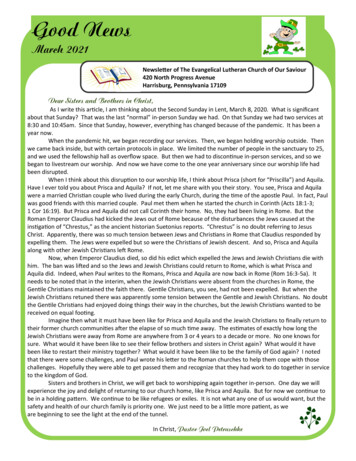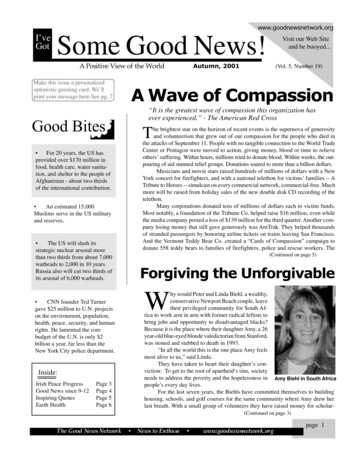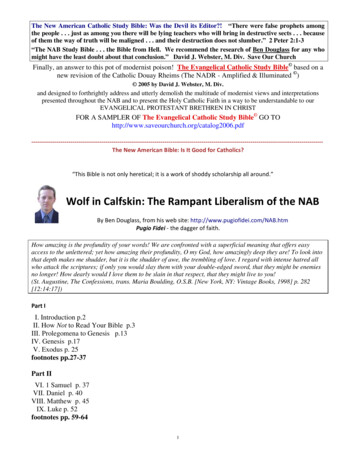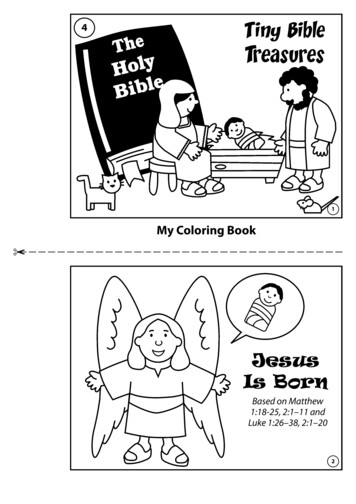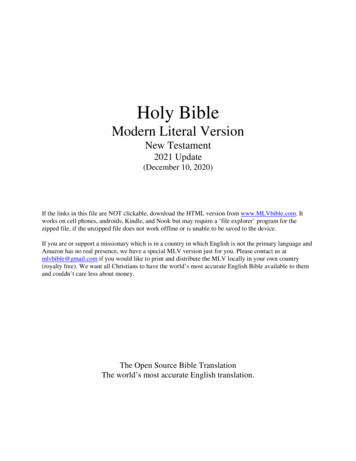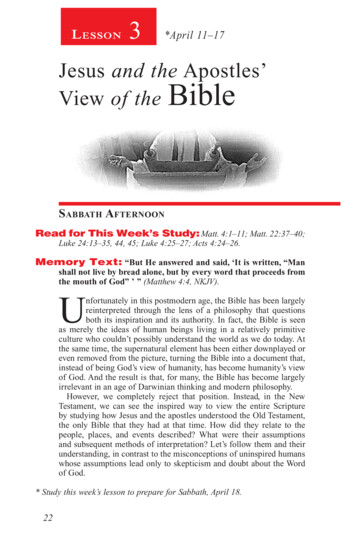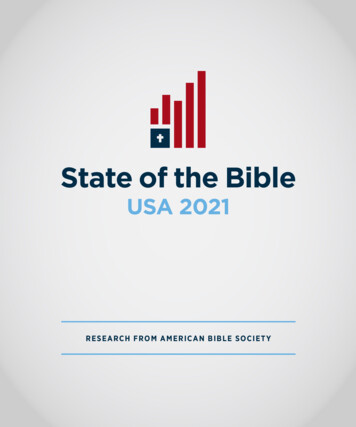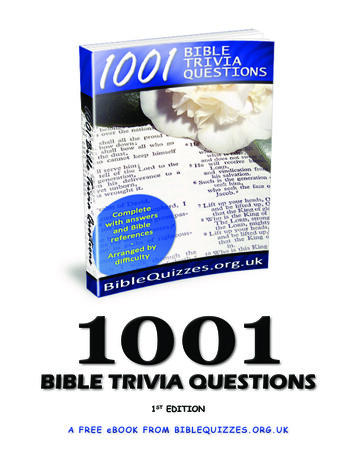
Transcription
Good News BibleFirst edition 1979Second edition 1995Third edition 2004Fourth edition 2015This edition 2017Text, illustrations and all helps are copyright:Good News Translation (Today’s English Version, Second Edition) 1992 American BibleSociety. All rights reserved.Anglicisation The British and Foreign Bible Society 1976, 1994, 2004Maps produced for The British and Foreign Bible Society by Hardlines 1997.Revised by The British and Foreign Bible Society 2017Illustrations by Swiss artist and storyteller Annie Vallotton, as taken from the Good NewsTranslation 1976, 1992 American Bible Society. Used by Permission.Additional material The British and Foreign Bible Society 2017The copyright for the derivative work of Anglicisation pertains only to the text within theGood News Translation (GNT) that British and Foreign Bible Society adapted for Britishliterary usage, consistent with Section 103(b) of the United States Copyright Act, 17 U.S.C.§ 103(b).Bible text from the Good News Translation (GNT) is not to be reproduced in copies orotherwise by any means except as permitted in writing by American Bible Society,101 North Independence Mall East, Floor 8, Philadelphia, PA 19106-2155(www.americanbible.org).All rights reserved. No part of this publication may be reproduced or transmitted in anyform or by any means, electronic or mechanical, including photocopy, recording or anyinformation storage or retrieval system, without permission in writing from the publisher.TitleLarge Print, HardbackCodeGNB 073ISBN978-0-564-07167-8Typesetting and production management by Bible Society Resources Ltd, a wholly-ownedsubsidiary of The British and Foreign Bible SocietyCover design by Rebekah ParsonsBSRL/2017Across the world, millions of people are not engaging with the Bible. This is often becausethe Scriptures aren’t available or accessible, or because their significance and valuehaven’t yet been recognised. Working in over 200 countries, Bible Society is a charity andon global mission to offer the Bible to every man, woman and child. This is because webelieve that when people engage with the Bible, lives can be changed, for good.This Bible may be distributed with other covers selected by national Bible Societies whoare members of the United Bible Societies. To find out more about the Bible Society in yourcountry visit: www.biblesociety.org
ContentsBooks of the Bible in alphabetical orderWelcome to the Good News BibleWhere do I begin?What to bear in mind as you readMapsOLD TESTAMENTThe cal BooksJoshuaJudgesRuth1 Samuel2 Samuel1 Kings2 Kings1 Chronicles2 423NEW TESTAMENTThe GospelspageMatthew3Mark45Luke72John116The Good News SpreadsActs147LettersRomans1871 Corinthians2052 Corinthians222MapsWord listIndexEzraNehemiahEstherPoetic BooksJobPsalmsProverbsEcclesiastesSong of SongsLamentationsMajor ansPhilippiansColossians1 Thessalonians2 Thessalonians1 Timothy2 266269271page329335339pageMinor kZephaniahHaggaiZechariahMalachiHebrewsJames1 Peter2 Peter1 John2 John3 909912914924page273287292297300305306307309
Books of the Bible inalphabetical orderActsAmosChronicles 1Chronicles 2ColossiansCorinthians 1Corinthians oseaIsaiahJamesJeremiahJobJoelJohnJohn 1John 2John 3JonahJoshuaJudeActsAmos1 Chr2 ChrCol1 Cor2 JasJerJobJoelJn1 Jn2 Jn3 JnJonJoshJudeOther AbbreviationsOld TestamentNew ngs 1Kings ahumNehemiahNumbersObadiahPeter 1Peter RuthSamuel 1Samuel 2Song of SongsThessalonians 1Thessalonians 2Timothy 1Timothy 2TitusZechariahZephaniahJudg1 Kgs2 KgsLamLevLkMalMkMtMicNahNehNumObad1 Pet2 PetPhlmPhilProvPsRevRomRuth1 Sam2 SamSong1 Thes2 Thes1 Tim2 63297662255259261266269914909
Welcome to the Good NewsBibleThe Good News Bible is a clear, easy-to-readtranslation of the Bible. It uses simple, everyday language so that as many people aspossible can read and understand it. Thishas made it a very popular translation, selling over 150 million copies worldwide.The second section, the New Testament,tells the good news of Jesus Christ andwhat happened to Jesus’ first followers. Itis called the New Testament to emphasisethat it is a continuation of the story in theOld Testament.What is the Bible?The Bible isn’t one book but a collection ofbooks, written at different times by differentpeople. They include many types of writing:laws, stories, history, poetry, short sayingsand proverbs, letters, visions, hymns andprayers, to name but a few.One of the most important things todo when you start reading a different partof the Bible is to ask yourself what kind ofwriting you think it is. This will help you tounderstand what you are reading.Finding your way around the Bible1. First you need to know whether a bookis in the Old or the New Testament, andwhich page number it starts on. For this,turn to the Table of Contents and findits page number.In this Bible we have produced twoTables of Contents, one showing theorder in which the books appear inthe Bible and the other in alphabeticalorder so that you can find the book titlemore easily.How are the books ordered?It is also important to remember that theBible is not organised according to whenthe books were written or when the eventsin them are set. The order of the books inthe Bible is affected by what type of bookthey are. So all the books that contain lawsare grouped together; all the books that tellthe history of Israel are in one place; theGospels are found next to each other, andso are the letters.2. Next you need to look at the referencefor the verse you need. References arealways given in this order: book title,chapter number and verse number.(The chapter and verse numbers areseparated by a full stop.)For example, Genesis 12.2 meansthe twelfth chapter of the book ofGenesis and the second verse of thatchapter.In this version, the book title andchapter numbers are repeated at thetop of each page so that you can findthem more easily.Why does the Bible have two sections?The Bible has two main sections, known as‘Testaments’. This word means ‘covenant’or ‘promise’ and refers to the promises Godmade to his people.The first section, called by Christians theOld Testament, contains the story of God’srelationship with his people, now knownas the Jews. This part of the Bible is seen asholy by Jews as well as by Christians and isknown by a variety of names, including theHebrew Scriptures.3. Once you have found the book andthe chapter number, you can find theverse number that you need within thatchapter.
Where do I begin?When you start to read the Bible it can be hard to know where to begin, and once begun, itcan be hard to know where to go next.The choice of where to start depends entirely on you. You may like to read whole booksat a time. You may like to read to understand the big picture of the message of the Bible.You may like to read some of the most famous stories, story by story. Or you may like to explore themes. Whatever you choose, there are some ideas below to help you get started.Reading a whole book at a timeIf you want to read a whole book at a time,it is good to start with the books that areeasier to read and move on to the morechallenging ones later. In other words,don’t start with Leviticus, which is a list ofinstructions that many people struggle toread; start with a story that is much easierto understand.Romans (p. 187) is the longest andmost complicated of them all, so youmay like to leave that until you haveread some of his other letters. Don’t just read Paul’s letters. Try 1 Peter(p. 292) or James (p. 287), which werewritten by other early Christians.4. It is also good to read some of theprophecy and poetry in the Old Testament.1. Start with a Gospel (New Testament). Mark’s Gospel is the shortest and is veryeasy to read (p. 45). You could try Luke’s Gospel first (p. 72)and then, straight away, read Acts(p. 147). Acts was also written by Lukeand goes on to tell the story of howthe good news of Jesus spread fromJerusalem to Rome.2. Next, try a book with a goodstory from the Old Testament. Ruth (p. 259) and Jonah (p. 895) areboth great stories and fun to read. 1 Samuel (p. 263) also has some interesting stories in it. Genesis (p. 3) has some of the bestknown stories in the whole Bible.3. Then you might like to look at oneof the letters in the New Testament. Philippians (p. 245), Ephesians (p. 239)and Colossians (p. 250) are all goodplaces to start with Paul’s letters. The Psalms (p. 535) have been used inJewish and Christian worship for over2,500 years. Read some of the Psalms:some of the most popular are 1, 23, 37,40, 46, 62, 84, 117, 121 and 139. The book of Isaiah (p. 669) has some inspiring passages. Have a look at 9.2–7;35.1–10; 40.1–31; 52.13—53.12 and61.1–11You may notice that the laws (e.g. Leviticus)and the visions (e.g. Revelation) aren’t onthis list. This is because they are the hardest books in the Bible to read. Do read them,but get used to reading some of the otherbooks first, and then, when you are ready,turn your attention to the more complicatedparts of the Bible.Reading some of the mostfamous passages in the BibleAnother way to read the Bible is to read thebest-loved and best-known stories. Hereare 100 of the most famous passages in theBible. Look through them and decide whichones you would like to read.
viiFrom the Law n and the fallGenesis 1—3Noah and the floodGenesis 6.9—9.17The tower of BabelGenesis 11.1–9The call of AbrahamGenesis 12.1–9 and 17.1–8Three visitors to AbrahamGenesis 18.1–15Joseph the dreamerGenesis 37—45The birth of MosesExodus 1.8—2.10Moses and the burning bushExodus 3.1–15The ten plaguesExodus 7.6—11.10Crossing the Red SeaExodus 13.17—14.31Manna and quailExodus 16Exploring CanaanNumbers 13.1—14.12Balaam’s donkeyNumbers 22.21–38The Ten CommandmentsDeuteronomy 5.1–22From the Historical books15. Entering the Promised LandJoshua 316. The fall of JerichoJoshua 5.13—6.2717. Deborah leads God’s peopleJudges 4—518. Gideon fights the MidianitesJudges 6—719. Samson and DelilahJudges 1620. Ruth and NaomiRuth 1—421. Israel asks for a king1 Samuel 822. God chooses David as king1 Samuel 16.1–1323. David kills Goliath1 Samuel 1724. David becomes king2 Samuel 5.1–1225. David and Bathsheba2 Samuel 1126. Solomon and a wise judgement1 Kings 3.16–2827. Solomon builds God’s temple1 Kings 628. Elijah and the prophets of Baal1 Kings 18.16–4629. The still small voice1 Kings 1930. Elijah is taken to heaven in a chariot2 Kings 2.1–1231. Judah is taken into exile in Babylon2 Kings 24—2532. The people are allowed to returnfrom exileEzra 1From the Major Prophets33. Isaiah’s vision of GodIsaiah 6.1–834. Isaiah’s prophecies about a MessiahIsaiah 7.10–1735. Isaiah’s message of comfortIsaiah 40.1–1136. The suffering servantIsaiah 52.13—53.1237. Jeremiah and the potter’s houseJeremiah 1838. Jeremiah and the new covenantJeremiah 31.1–3439. Ezekiel’s vision of a chariotEzekiel 140. Ezekiel’s vision of dry bonesEzekiel 37.1–1441. Daniel and the fiery furnaceDaniel 342. Daniel and the lions’ denDaniel 6From the Minor Prophets43. Hosea is told to marry a prostituteHosea 144. Joel’s vision of the futureJoel 2.28–3245. JonahJonah 1—4
What to bear in mind as youreadThroughout Christian history, people have found the Bible to be inspiring but not always easyto read. There are a few things to keep in mind, which may help you as you read the Bible.1. Recognise that the Bible waswritten a long time ago.Even the newest parts of the Bible are about2,000 years old. Remember this as you readit, and try to imagine what it might havebeen like to live when the books were firstwritten.2. Don’t read passages entirelyon their own; look at whatcomes before and after them.It’s easy to take verses, or sometimes wholestories, out of context, by reading them bythemselves. Try to work out where they fitin the bigger story or argument of the book.You’ll get a much better sense of what’sgoing on and what it all means.3. Ask yourself what type ofbook you are reading.We read different types of books differently.You would never read a list of phone numbers in the same way as you read a novel, sowork out if the passage you are reading ispoetry or prose, law or history, wise sayingsor a vision, and then read with that in mind.It will make a big difference.4. Read what’s actually there, notwhat you think might be there.It is all too easy to assume that we knowwhat a Bible story says. This is particularly true for famous stories; we can think weknow what it is about and not actually readit. So slow down and chew the story over.You’ll often find that you understand it ina new way.5. Read the Bible with other people.We all bring our own experiences andthoughts to the Bible. It can help, therefore,to ask how other people see it and read it.You’ll gain a sense of what other peoplethink the Bible says.6. Don’t read the Bible from startto finish, as you would a novel.The Bible is not one book; it is a library ofbooks. The books are not always printed intime order; instead, they often jump aroundfrom time period to time period. As a result,reading them in the order they are printedcan be confusing and unhelpful.7. Ask questions.Use your brain while you read. Ask questions. Explore ideas. If you really can’tunderstand something, make a note of itand come back later. Sometimes, returningto a difficult question can help.8. Keep a notebook of your questions.Make notes as you read. What inspires you?What confuses you? Which are your favourite verses? Jot them down. If you return toyour notes later, they will remind you ofwhat you enjoyed before. Sometimes, whenyou look back at what confused you, it is lesstroubling than it was before.9. Don’t worry about it.Many people find parts of the Bible difficultto understand. It was written a long timeago. It comes from a different culture. If youfind something difficult, move on. Focus onthe parts you do understand and not theparts you don’t.10. Do keep going.Above all, keep going. The more you read,the easier it gets.
BitterLakesPithom SukkothSpies sent out by Moses(Num 13 and Deut 1.19–33EGYPTGOSHENRamesesDesert of ShurCoast road to theland of the PhilistinesMt. SinaiSinaiWilderness of ParantiaoinPlaHormahHebronEziongeberG00Kadesh BarneaCJericho5050100EDOMMOABDibonHeshbonMt NeboMIDIANWilderness of ZinabaMany of the places referred to in the biblical acconts in the books of Exodus and Numberscannot be identified. The map shows the route of the exodus in general terms.River NileilisfPhANANAGulf of AqProbable Route of the Exodusoulff Suez100 miles150 kmN
GENESISThe start of all thingsWhat’s it about? Genesis is all about beginnings: the beginnings oftime, the beginnings of the universe, the beginnings of God’s people and the beginnings of his people going their own way.Who wrote it? The first five books ofthe Bible are often called the Torah(from the Hebrew word meaning‘teaching’) or Pentateuch(meaning ‘five books’ inGreek). Tradition has itthat these bookswere written byMoses, but noone is sure.Why read it?These ancientstories werepassed down fromgeneration togeneration, andthey tell us manythings about God, usand our relationshipwith him. The people in thisbook are not so different from us: they triumph with God’s help and failspectacularly when they turn against him.What’s it to me? Genesis raises some of the big questions of life andgives us space to discover answers to those questions.The Story of Creation1In the beginning, when God createdthe universe,* 2ithe earth was formlessand desolate. The raging ocean that covered everything was engulfed in total darkness, and the Spirit of God* was moving1.1 In the beginning the universe; or In thebeginning God created the universe; or When Godbegan to create the universe.1.2 the Spirit of God; or the power of God; or a windfrom God; or an awesome wind.over the water. 3iThen God commanded,“Let there be light” — and light appeared.4iGod was pleased with what he saw. Thenhe separated the light from the darkness,5iand he named the light “Day” and thedarkness “Night”. Evening passed andmorning came — that was the first day.6–7iThen God commanded, “Let there bea dome to divide the water and to keep itSee also: 1.3: 2 Cor 4.6 1.6–8: 2 Pet 3.5
4GENESISin two separate places” — and it wasdone. So God made a dome, and it separated the water under it from the waterabove it. 8iHe named the dome “Sky”.Evening passed and morning came —that was the second day.9iThen God commanded, “Let the waterbelow the sky come together in one place,so that the land will appear” — and it wasdone. 10iHe named the land “Earth”, andthe water which had come together henamed “Sea”. And God was pleased withwhat he saw. 11iThen he commanded,“Let the earth produce all kinds of plants,those that bear grain and those that bearfruit” — and it was done. 12iSo the earthproduced all kinds of plants, and God waspleased with what he saw. 13iEveningpassed and morning came — that was thethird day.14iThen God commanded, “Let lightsappear in the sky to separate day fromnight and to show the time when days,years, and religious festivals* begin;15ithey will shine in the sky to give light tothe earth” — and it was done. 16iSo Godmade the two larger lights, the sun to ruleover the day and the moon to rule over thenight; he also made the stars. 17iHe placedthe lights in the sky to shine on the earth,18ito rule over the day and the night, andto separate light from darkness. And Godwas pleased with what he saw. 19iEveningpassed and morning came — that was thefourth day.20iThen God commanded, “Let thewater be filled with many kinds of livingbeings, and let the air be filled with birds.”21iSo God created the great sea monsters,all kinds of creatures that live in the water,and all kinds of birds. And God waspleased with what he saw. 22iHe blessedthem all and told the creatures that live inthe water to reproduce, and to fill the sea,and he told the birds to increase in number. 23iEvening passed and morningcame — that was the fifth day.24iThen God commanded, “Let theearth produce all kinds of animal life:1.14 religious festivals; or seasons.1Old Testamentdomestic and wild, large and small” —and it was done. 25iSo God made themall, and he was pleased with what hesaw.26iThen God said, “And now we willmake human beings; they will be like usand resemble us. They will have powerover the fish, the birds, and all animals,domestic and wild,* large and small.”27iSo God created human beings, makingthem to be like himself. He created themmale and female, 28iblessed them, andsaid, “Have many children, so that yourdescendants will live all over the earthand bring it under their control. I am putting you in charge of the fish, the birds,and all the wild animals. 29iI have provided all kinds of grain and all kinds offruit for you to eat; 30ibut for all the wildanimals and for all the birds I have provided grass and leafy plants for food” —and it was done. 31iGod looked at everything he had made, and he was verypleased. Evening passed and morningcame — that was the sixth day.And so the whole universe wascompleted. 2iBy the seventh dayGod finished what he had been doingand stopped working. 3iHe blessed theseventh day and set it apart as a specialday, because by that day he had completed his creation* and stopped working. 4iAnd that is how the universe wascreated.2The Garden of EdenWhen the LORD* God made the universe, 5ithere were no plants on the earthand no seeds had sprouted, because hehad not sent any rain, and there was noone to cultivate the land; 6ibut waterwould come up from beneath the surfaceand water the ground.1.26 One ancient translation animals, domestic andwild; Hebrew domestic animals and all the earth.2.3 by that day he had completed his creation; or onthat day he completed his creation.2.4 THE LORD: See LORD in Word ListSee also: 1.26: 1 Cor 11.7 1.27: Mt 19.4; Mk 10.61.27–28: Gen 5.1–2 2.2: Heb 4.4, 102.2–3: Ex 20.11
Historical books1 SAMUELMay you become rich in the clan of Ephrath and famous in Bethlehem. 12iMay thechildren that the LORD will give you by thisyoung woman make your family like thefamily of Perez, the son of Judah andTamar.”263Boaz took Ruth home as his wife.The LORD blessed her, and she becamepregnant and had a son. 14iThe womensaid to Naomi, “Praise the LORD! He hasgiven you a grandson today to take careof you. May the boy become famous inIsrael! 15iYour daughter-in-law loves you,and has done more for you than sevensons. And now she has given you agrandson, who will bring new life to youand give you security in your old age.”16iNaomi took the child, held him close,*and took care of him.17iThe women of the neighbourhoodnamed the boy Obed. They told everyone,“A son has been born to Naomi!”Obed became the father of Jesse, whowas the father of David.18–22iThis is the family line from Perez toDavid: Perez, Hezron, Ram, Amminadab,Nahshon, Salmon, Boaz, Obed, Jesse,David.See also: 4.12: Gen 38.27–304.16 held him close; or adopted him.Boaz and his Descendants13iSoTHE FIRST BOOK OFSAMUELThe arrival of the kingsWhat’s it about? Samuel was a greatman of God, a prophet and judge whoanointed God’s chosen kings. In 1 Samuel,we encounter a failed king, Saul, and aglorious king, David.Who wrote it? We don’t know, but 1Samuel, along with 2 Samuel, could havebeen written and collated over a period oftime after the deaths of Samuel, Sauland David.Why read it? This first book of Samuel talksabout how God is king. He is greater than anyhuman king; he guides his people and is in control. Through thesoap-opera-worthy storylines, God’s will and power stand out.What’s it to me? Even though God is king and is in control, thingsaren’t always rosy. David was made king by God and Samuel, but hedidn’t take up that role straight away. 1 Samuel shows that life followingGod’s way might not be straightforward.
2961 SAMUEL 306iDavid was now in great trouble,because his men were all very bitter aboutlosing their children, and they were threatening to stone him; but the LORD his Godgave him courage. 7iDavid said to the priestAbiathar son of Ahimelech, “Bring me theephod,” and Abiathar brought it to him.8iDavid asked the LORD, “Shall I go afterthose raiders? And will I catch them?”He answered, “Go after them; you willcatch them and rescue the captives.”9iSo David and his 600 men started out,and when they arrived at the brook ofBesor, some of them stayed there. 10iDavidcontinued on his way with 400 men; theother 200 men were too tired to cross thebrook and so stayed behind. 11iThe menwith David found an Egyptian out in thecountry and brought him to David. Theygave him some food and water, 12isomedried figs, and two bunches of raisins. Afterhe had eaten, his strength returned; he hadnot had anything to eat or drink for threefull days. 13iDavid asked him, “Who is yourmaster, and where are you from?”“I am an Egyptian, the slave of anAmalekite,” he answered. “My master leftme behind three days ago because I was ill.14iWe had raided the territory of theCherethites in the southern part of Judahand the territory of the clan of Caleb, andwe burnt down Ziklag.”15i“Will you lead me to those raiders?”David asked him.He answered, “I will if you promise me inGod’s name that you will not kill me orhand me over to my master.” 16iAnd heled David to them.The raiders were scattered all over theplace, eating, drinking, and celebratingbecause of the enormous amount of lootthey had captured from Philistia and Judah.17iAt dawn the next day David attackedthem and fought until evening. Except for400 young men who mounted camels andgot away, none of them escaped. 18iDavidrescued everyone and everything theAmalekites had taken, including his twowives; 19inothing at all was missing. DavidSee also: 30.7: 1 Sam 22.20–23Old Testamentgot back all his men’s sons and daughters,and all the loot the Amalekites had taken.20iHe also recovered all the flocks andherds; his men drove all the livestock in frontof them* and said, “This belongs to David!”21iThen David went back to the 200 menwho had been too weak to go with himand had stayed behind at the brook ofBesor. They came forward to meet Davidand his men, and David went up to themand greeted them warmly. 22iBut somemean and worthless men who had gonewith David said, “They didn’t go with us,and so we won’t give them any of the loot.They can take their wives and children andgo away.”23iBut David answered, “My brothers,you can’t do this with what the LORD hasgiven us! He kept us safe and gave us victory over the raiders. 24iNo one can agreewith what you say! All must share alike:whoever stays behind with the suppliesgets the same share as the one who goesinto battle.” 25iDavid made this a rule, andit has been followed in Israel ever since.26iWhen David returned to Ziklag, he sentpart of the loot to his friends, the leaders ofJudah, with the message, “Here is a present for you from the loot we took fromthe LORD’s enemies.” 27iHe sent it to thepeople in Bethel, to the people in Ramahin the southern part of Judah, and to thepeople in the towns of Jattir, 28iAroer, Siphmoth, Eshtemoa, 29iand Racal; to the clanof Jerahmeel, to the Kenites, 30iand to thepeople in the towns of Hormah, Borashan,Athach, 31iand Hebron. He sent it to all theplaces where he and his men had roamed.The Death of Saul and his Sons(1 Chr 10.1–12)The Philistines fought a battleagainst the Israelites on Mount Gilboa. Many Israelites were killed there, andthe rest of them, including King Saul andhis sons, fled. 2iBut the Philistines caughtup with them and killed three of Saul’ssons, Jonathan, Abinadab, and Malchishua.3130.20 Probable text his men front of them;Hebrew unclear.
Historical books2 SAMUEL3iThe fighting was heavy round Saul, andhe himself was hit by enemy arrows andbadly wounded. 4iHe said to the youngman carrying his weapons, “Draw yoursword and kill me, so that these godlessPhilistines won’t gloat over me and killme.” But the young man was too terrifiedto do it. So Saul took his own sword andthrew himself on it. 5iThe young man sawthat Saul was dead, so he too threw himself on his own sword and died with Saul.6iAnd that is how Saul, his three sons, andthe young man died; all of Saul’s men diedthat day. 7iWhen the Israelites on theother side of the Valley of Jezreel and eastof the River Jordan heard that the Israelitearmy had fled and that Saul and his sonshad been killed, they abandoned theirtowns and fled. Then the Philistines cameand occupied them.2978iThe day after the battle the Philistineswent to plunder the corpses, and theyfound the bodies of Saul and his threesons lying on Mount Gilboa. 9iThey cut offSaul’s head, stripped off his armour, andsent messengers with them throughoutPhilistia to tell the good news to their idolsand to their people. 10iThen they put hisweapons in the temple of the goddessAstarte, and they nailed his body to thewall of the city of Beth Shan.11iWhen the people of Jabesh in Gileadheard what the Philistines had done toSaul, 12ithe bravest men started out andmarched all night to Beth Shan. They tookdown the bodies of Saul and his sons fromthe wall, brought them back to Jabesh, andburnt them there. 13iThen they took thebones and buried them under the tamarisktree in the town, and fasted for seven days.THE SECOND BOOK OFSAMUELThe promise of a future kingWhat’s it about? 2 Samuel continues the story of1 Samuel, with David finally taking control of Israel. Godmade a promise to David about his family tree, assuringhim that one of his descendants would always be king.Who wrote it? We don’t know, but 2 Samuel, along with1 Samuel, could have been written and collated after thedeath of David.Why read it? David was a great king,but he made some mistakes.2 Samuel is an honest portrayalof a flawed man who lovedGod. The promise that Godmade to David foretells the coming ofJesus, who was part of David’s family.What’s it to me? David’s flaws as a king show us that everyone canmake a difference for God. Despite his mistakes, David was still a mightyking.
2982 SAMUEL 1David Learns of Saul’s Death1After Saul’s death David came backfrom his victory over the Amalekitesand stayed in Ziklag for two days. 2iThenext day a young man arrived fromSaul’s camp. To show his grief, he hadtorn his clothes and put earth on hishead. He went to David and bowed tothe ground in respect. 3iDavid askedhim, “Where have you come from?”“I have escaped from the Israelite camp,”he answered.4i“Tell me what happened,” David said.“Our army ran away from the battle,” hereplied, “and many of our men werekilled. Saul and his son Jonathan were alsokilled.”5i“How do you know that Saul andJonathan are dead?” David asked him.6iHe answered, “I happened to be onMount Gilboa, and I saw that Saul wasleaning on his spear and that the chariotsand horsemen of the enemy were closingin on him. 7iThen he turned round, sawme, and called to me. I answered, ‘Yes,sir!’ 8iHe asked who I was, and I told himthat I was an Amalekite. 9iThen he said,‘Come here and kill me! I have been badlywounded, and I’m about to die.’ 10iSo Iwent up to him and ki
Bible The second section, the New Testament, tells the good news of Jesus Christ and what happened to Jesus’ first followers. It is called the New Testament to emphasise that it is a continuation of the story in the Old Testament. Finding your way around the Bible 1. First you need to know whether a book

